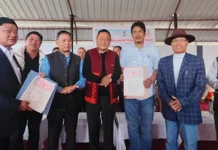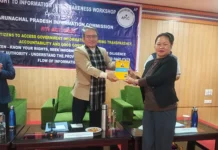Monday Musing
[ Junroi Mamai ]
Tea plantation is one of the primary and reliable sources of livelihood for the people of our state. A number of people in parts of the state are engaged in tea cultivation for decades. In recent years, however, small tea cultivators in the state, especially of Changlang district, are confronting a series of obstacles that threaten their livelihood and the sustainability of tea cultivation in the region.
One of the hurdles impeding its growth is government’s regulation. A significant challenge arises from the 1996 Supreme Court directive, which mandates that tea growers must obtain clearance from the union Ministry of Environment and Forests(MoEF) to ensure compliance with the Forest Conservation Act, 1980.
This has made difficult for small local tea growers to get approval from the MoEF and register themselves with the Tea Board of India for support and subsidies.
Even after possessing necessary land documents like land possession certificate (LPC), the small local tea growers cannot avail of the support and subsidies from the Tea Board of India, unlike the large scale cultivators of the state.
Another important factor impeding growth of the small local tea growers in the state is the economic pressure and market dynamics. Most of the green tea leaves goes to Assam from Arunachal but big tea garden players and middlemen make it difficult for farmers to compete in prices because of monopoly by the tea sharks in Assam. Small tea cultivators from Arunachal cannot sell green tea leaves for a standard price, despite its good quality, owing to manipulations by big tea garden cultivators and middlemen.
Also, there have been instances when the tea grower’s associations in Assam have called for banning the entry of green tea leaves from Arunachal into Assam. In 2023, the All Assam Small Tea Growers’ Association, Tinsukia District Committee had demanded banning the entry of green tea leaves into Assam, saying that the green tea leaves entering Assam from Arunachal made the small tea growers in Tinsukia district suffer loss and the Assam tea brand lose its quality.
Apart from these challenges, infrastructure and support deficiency also hamper the growth of small tea growers of our state. Road connectivity and difficult terrain of the state make it cumbersome for farmers to produce and sell their green leaves. Also, there is an absence of technical knowledge among the state’s tea growers to cultivate tea and improve their yield.
In the past couple of years, the state’s small local tea growers came together and tried to fix these issues,but failed miserably due to lack of proper planning and direction. These issues need the state government’s urgent attention. The GoAP should initiate strict measures to ensure a price support system that would help the small tea growers get a standard rate for their product, free from market manipulation. The GoAP should also ensure that the state’s small tea growers get easy access to Tea Board of India for financial and logistic support and ease paper work for approval from the MoEF for tea cultivation. Imparting scientific knowledge and training to tea growers should also be prioritised by the state government for maximum growth and profit.




